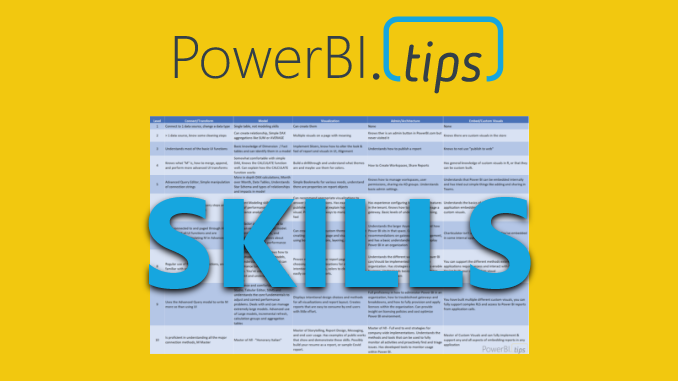Power BI took the BI world by storm 5 years ago, there has been a release of the Power BI Desktop almost every single month. The infant that was Power BI has grown into a fully grown behemoth of an enterprise tool. It covers the spectrum of data access and storage options. It has internal and 3rd party tools that provide capabilities that are second to none. Top that off with its flexible licensing and implementation models within organizations and it is no wonder it is in front of the pack. As a result of that pace and growth, the amount of knowledge and skills required to build, manage and implement Power BI has also grown significantly. This has resulted in “Power BI”, meaning a lot of things, to many different people. Today we aim to solve that problem by introducing the Power BI Skills Matrix.
First in a three-part series
This is the first post in a three-part series. It is meant to help people make an honest assessment of their skills. The intent is to enable everyone to be able to clearly articulate their skills to themselves and others. In addition, this content can also be used by hiring managers and recruiters as a litmus test to better engage with individuals around their Power BI technical skills. The second post will focus on techniques for honing skills. The third will focus on methods or behaviors that will help people sell their skills and themselves in an interview
The aim of this series is to bring some clarity around what everyone can, and should, expect from individuals who work with “Power BI”.
Focus Areas
A number of job requirements and focus areas rely heavily on one or more areas of Power BI. Meanwhile, the generalization of the term “Power BI” in conversation and in job descriptions can drive confusion. An interviewer may only be focused on one skill or another. It is good for everyone to understand the entire scope of skills. Then we can collectively understand what might be expected in a particular role. If you have an interest in what those specific role areas might be, check out Steve Campbell’s blog here where he dives into some of those specifics.
During the last 6 months, I’ve been extensively interviewing for Power BI Developer and Data Engineering roles. I’ve had the pleasure to speak with a wide variety of candidates across the United States. We ran them all through the same battery of questions and have discovered some consistent experiences. I believe this series is a great way for me to share my thoughts on what sets apart the great candidates from those I move past in regards to their technical skills.
Rate Yourself
To begin with, you need a litmus test, so we’ll start with a little exercise. Think about your level of expertise in Power BI and rate yourself from 1 to 100.
1 – you just heard about Power BI
100 – You are a Power BI Master
What did you rate yourself?
I’ll describe the general skills that align to each of these ratings. After that, we’ll see if what you have in your mind matches the output of the Skills Matrix. I designed a simple grid of 10 increasingly difficult skills in 5 different areas. Each cell is worth 2 points and there are 50 cells, therefore a total of 100 pts. Each column can have a max point total of 20. The more points in a skill column, the stronger you are in that particular area. This should correspond to specific roles you would be a good fit for. As a result, the more overall experience you have, the higher the overall score.
Each of the skills in a rating will build on the previous level, the skills represented carry forward to all other levels. For instance, if you reach row 5 for Model, you know you already have 10 pts for that column.
There is a little room for interpretation as Enterprise skills in Connect/Transform may be in other tools. Its the core progressions that count the most in terms of expertise.
Power BI Skills Matrix
Now, let’s go through the exercise of rating yourself again. You should be able to clearly see which skills you are strongest in and what your overall knowledge (score) of Power BI would be. Did it match your initial thoughts?
Be honest with yourself and your skills. One of the worst things you can do is over promise your skills on a resume. Because when it comes time to deliver in a technical discussion, you will likely fall short.
The Power BI Skills Matrix above provides a straightforward way for individuals to quickly identify strengths and weaknesses from a technical standpoint. There are a wide variety of jobs that may focus more, or less, on the use of these Power BI areas. The first step in getting into any of them is to accurately understand and describe your current skills. The next post in this series will build on this matrix where we’ll recommend next steps. Focusing on learning and improving areas that you might be weak in is key in setting yourself up for success. I hope the community at large finds this useful, and if you have any recommendations for updating or enhancing our matrix, please feel free to let us know.
If you like the content from PowerBI.Tips, please follow us on all the social outlets to stay up to date on all the latest features and free tutorials. Subscribe to our YouTube Channel, and follow us on Twitter where we will post all the announcements for new tutorials and content. Alternatively, you can catch us on LinkedIn (Seth) LinkedIn (Mike) where we will post all the announcements for new tutorials and content.
As always, you’ll find the coolest PowerBI.tips SWAG in our store. Check out all the fun PowerBI.tips clothing and products:

